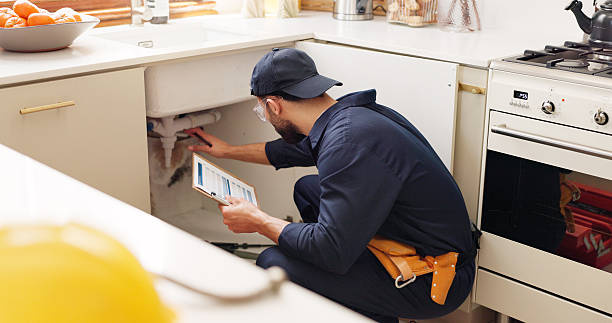What is the 1% Rule for Home Maintenance?

Strong 8k brings an ultra-HD IPTV experience to your living room and your pocket.
Taking care of a home is more than just cleaning and organizing—it’s about preserving its value and preventing expensive repairs down the road. But how do homeowners know how much to spend on home maintenance each year? That’s where the 1% rule comes in.
This simple yet effective guideline helps homeowners create a realistic budget for annual upkeep. Whether you're reaching out to a repair expert near me in Somerville MA, or relying on local service providers like Hands on Duty, understanding the 1% rule can keep you prepared and your home protected.
Understanding the 1% Rule
The 1% rule for home maintenance recommends that you budget 1% of your home’s total value each year for maintenance and repairs. For example, if your home is worth $300,000, you should set aside $3,000 annually for upkeep.
This guideline doesn’t mean you’ll spend that exact amount every year. Some years, you might only need minor repairs, while others could bring larger expenses like HVAC servicing or roof replacement. The idea is to build a maintenance fund so you're not caught off-guard when issues arise.
Why the 1% Rule Matters
A proactive approach to home maintenance offers numerous advantages:
- Prevents Costly Repairs: Small issues like leaks or cracks can become major repairs if ignored.
- Preserves Property Value: Routine upkeep helps maintain or even increase your home’s resale value.
- Improves Safety and Comfort: Ensures systems like plumbing, electrical, and HVAC are functioning properly.
- Reduces Emergency Stress: Budgeting ahead avoids last-minute financial strain.
Whether you’re considering calling a nearby contractor or tackling projects yourself, having a maintenance fund supports better decision-making.
What Should Be Included in Your 1% Budget?
Many homeowners wonder what kind of tasks fall under the 1% rule. Here’s a breakdown of typical services and areas to include:
- Roofing Repairs or Replacement
Keep an eye on shingles, flashing, and gutters.
- HVAC System Maintenance
Routine servicing helps improve efficiency and prolongs lifespan.
- Plumbing Inspections and Repairs
Leaky faucets, clogged drains, or water heater maintenance are common needs.
- Electrical System Checks
Safety inspections, wiring upgrades, or outlet replacements may be required.
- Exterior Maintenance
Includes siding, painting, and driveway sealing.
- Appliance Repairs or Replacement
Think washers, dryers, ovens, and refrigerators.
If you're unsure about certain tasks, consult with local service experts near me who can assess your home's needs and give estimates.
When the 1% Rule May Not Be Enough
Although the 1% rule is a useful baseline, it isn’t one-size-fits-all. You may need to adjust based on:
- Home Age: Older homes typically require more repairs and system updates.
- Home Size: Larger homes mean more square footage to maintain.
- Climate and Location: Harsh weather or coastal conditions can accelerate wear and tear.
- Renovation Needs: Upgrades to kitchens, bathrooms, or flooring aren’t usually covered under standard maintenance.
In these cases, some experts suggest saving up to 2% or even 3% of your home’s value annually. Reaching out to a nearby home repair company or a local contractor can help evaluate your specific situation.
How to Implement the 1% Rule in Real Life
Here are a few simple steps to start using the 1% rule effectively:
- Determine Your Home's Current Market Value
Use a recent appraisal or online tools to get an estimate.
- Set Up a Dedicated Savings Account
Deposit 1/12th of your annual maintenance budget into it each month.
- Create a Maintenance Checklist
Include both seasonal and annual tasks to stay organized.
- Schedule Routine Inspections
Hire local service experts for yearly checks of your roof, HVAC, plumbing, and electrical systems.
- Plan for Larger Repairs in Advance
Big-ticket items like roof replacement or furnace upgrades may not happen often—but when they do, you'll be ready.
Searching online for home repair services near me or contractors for installation and repairs can help you locate skilled professionals to manage more complex jobs.
Conclusion
The 1% rule for home maintenance is a smart and simple way to protect your home and your wallet. By budgeting just 1% of your home’s value annually, you can cover essential repairs, prolong the lifespan of major systems, and maintain your property’s value. If you’re ever in doubt, consult nearby repair experts or local contractors who can help you prioritize tasks and plan for future costs.
Stay ahead of issues, plan strategically, and make informed decisions about your home’s care—because a well-maintained home is a safe and valuable one.
FAQs
1. What does the 1% rule for home maintenance mean?
It means you should set aside 1% of your home's value annually to cover routine maintenance and minor repairs.
2. Does the 1% rule cover renovations?
No, the 1% rule is for upkeep and repairs only. Renovations and upgrades require a separate budget.
3. Should I hire a contractor or do the work myself?
For minor tasks, DIY may be sufficient. For major repairs, it's safer to hire local service experts or repair professionals near me.
4. How do I know if I'm spending too much on maintenance?
Track your expenses yearly. If you’re consistently over 3%, consult a nearby contractor to assess for deeper issues.
5. What if I skip annual maintenance?
Delaying upkeep often leads to more costly repairs later. Preventative care is almost always cheaper in the long run.
Note: IndiBlogHub features both user-submitted and editorial content. We do not verify third-party contributions. Read our Disclaimer and Privacy Policyfor details.




